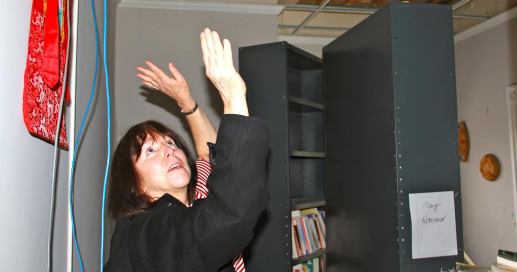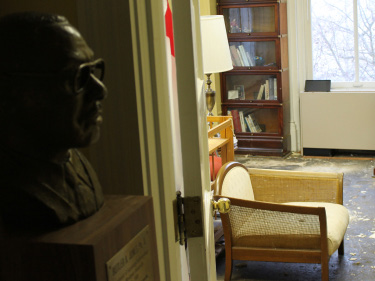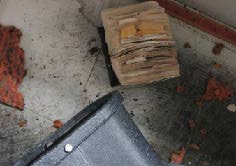
Frigid temperatures, in combination with the age of the historic building, caused the pipe to burst. This in turn triggered the building’s sprinkler system. A pipe above Howard’s office was the source of the leak, causing extensive damage to her personal and professional items.
“I breast fed my babies in this chair, consoled many students in this chair,” Howard said of the lounge chair that became collateral damage of the Elliott flood.
“But at the end of the day, everyone was safe. I totaled my car last year when I hit a cow, and that was something. This, this is nothing.”
When Public Safety Officer Jay McCann walked into the foyer of Elliott Hall the evening of Jan. 8, a waterfall greeted him.
“My first feelings can be described as very emotional,” McCann said. “Here stands the matriarch of our community and the origins of OWU, and she is hurting. It was as if you could feel the pain of the building as you walked through. It was expressed by all those who saw it…..sad day.”
President Rock Jones walked through the building a few hours after the incident was reported, and said the damage he saw was “just devastating.”
“I received a phone call probably around 11 p.m. from Dan Hitchell who broke me the news,” Jones said. “When we saw the extent of the damage, we realized the building had to be closed. There was still a lot of water, but you know, the building and grounds staff worked all night long and did a really terrific job working to dry the building out.”
The flooding that took McCann by such surprise was caused by a pipe in the sprinkler system that burst due to the extreme cold wave, or the ‘Polar Vortex,’ plaguing Delaware and the rest of the Midwest over the last two months. Director of physical plant operations Peter Schantz said the flooding could not have been prevented.
“The fire suppression system functioned per its design,” Schantz said. “Unfortunately, aspects of the design made the system vulnerable to extreme cold weather. It took the severe cold weather caused by the polar vortex event in early January to reveal the vulnerable aspects of the system. We are taking steps to change the system design to prevent this in the future.”
Those steps include immediately checking the status of all of OWU’s water and sprinkler systems. Jones said there is a concern for the buildings on campus, as the cold weather shows no signs of letting up soon. The Corns building has the same sprinkler system as Elliott.
“We are in the midst of another, even longer, cold spell, so they (B&G) are being very diligent in making sure all of our pipes are running, but it’s a very scary time. “
Had Public Safety not initially reported the flooding thus making it possible for the water to the building to be turned off, Schantz said the damage could have been much more severe.
“We estimate the broken sprinkler line released about 12,000 gallons of water per hour,” he said.
Thirty to 90 minutes elapsed before the break was isolated, meaning 6,000 to 18,000 gallons of water cascaded through Elliott.
“The building and contents would have absorbed significantly more water with each additional hour that water was released,” Schantz said.
Because the buildings renovation plan is not completely finalized nor has the total damage been fully assessed, Schantz said it was not possible to disclose just how much it will cost to restore Elliott Hall in full. Hitchell told staff at their January meeting the cost could be $250,000, with the university’s insurance covering all but $50,000, the plan’s deductible.
The renovations for Elliott will not affect the construction on the JayWalk or the restoration of Merrick Hall as those projects are assigned to different contractors, but that doesn’t mean the renovations will move at a quicker pace. According to Jones, delays will surely occur as buildings across the Midwest are experiencing pipe bursts, and increasing the demand for building materials.
“The big issue that could effect us is that there were so many water pipe breaks all across this part of the country that there is going to be a surge in demand for things like carpet and drywall ceiling tiles, and fillers for cracks,” Jones said. “So, there is a significant, sudden need for the hundreds and hundreds of buildings across the Midwest that have suffered from this kind of damage.”

Some private universities had as many as 8 buildings with burst water lines, Hitchell told faculty.
Elliott, the oldest building on Ohio Wesleyan University’s campus (OWU), is on the National Register of Historic Places, so all renovations must be carried out in compliance with the registry’s requirements. Jones said although OWU will receive no financial backing from the registry towards the renovations, the administration is dedicated to ensuring Elliott maintains it’s historic appearance.
“We certainly have a strong desire to restore the historic beauty and feel of the building, and during the restorations we will be keeping that mentality,” Jones said. “And, as unfortunate as the flooding is, it is a chance to add some modern amenities to the building. We want to get this fixed as soon as possible, but we also want to take time to make sure we do it right.
“We’ve met with the chairs of the departments to look into improvements for the building…it does give us a chance to make them and make the building better than ever.”

Video from Jay McCann
Jones said accommodating the faculty housed in Elliot is one of his biggest concerns. The university relocated the departments of history, politics and government, international studies, as well as the Historian magazine, to the Stuart Annex and moved the Communications Department has been relocated to 4 Williams Drive, working in what Jones calls “difficult circumstances.”
Despite the difficulty of moving and salvaging office supplies and personal items, Cole Hatcher, director of media and community relations, is staying on the bright side, saying the transition was quick enough that the department lost little to no time getting back to work.
“We haven’t stopped or even delayed any work because of the flooding,” Hatcher said. “Currently, we are working from 4 Williams Drive in space that had been used by the Student Health Center during the Stuyvesant Hall renovation. Former exam rooms are now offices. The space accommodates our full staff and student interns. We’ve been very lucky.”
Upon hearing that no one was injured during the flooding, Hatcher said his immediate concern was for the expensive equipment the department uses on a regular basis.
“I wanted to make sure that our cameras and web streaming equipment survived,” Hatcher said. “And everything did, which also has helped us continue our work. Public Safety was kind enough to verify this for me as the scene was unfolding. We also had many filing cabinets filled with paper documents and photos, but those fared relatively well, too.”
Professor of Anthropology Mary Howard’s office experienced the most devastating of blows, as the pipe bust occurred in her office’s ceiling. However, she, like Hatcher, is upbeat.
”Change is always challenging for all of us but since life is change, it makes sense to me to just go with the flow,” Howard said. “Besides, based on my observations of national and international poverty, this slight disruption seems pale in comparison to me.”
Howard said the OWU as a whole has been “incredibly kind and caring” in helping her with the transition.
“We owe a large debt of gratitude to the Buildings and Grounds people who must have filled dozens of dump trucks with discarded books and file contents.”